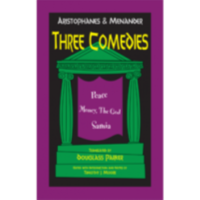
Hackett (2014) p/b 230pp £13.50 (ISBN 9781624661853)
Douglass Parker was responsible for many translations including, with William Arrowsmith and Richard Lattimore, the Michigan series of Aristophanes from the 1960s onwards. At his death in 2011, he left unpublished complete (or almost complete) translations of these three plays which happen, fortuitously, to represent the three ‘periods’ into which scholars these days divide Greek comedy, the Old, Middle and New (the introduction gives a clear and simple account of the differences between them and thus how the genre evolved between the mid-5th and late 4th C BC).
It is difficult to know how to describe these translations. The single word that comes most readily to mind is ‘rollicking’. P. intended his translations for public performance to non-specialist audiences rather than for academics, and they were widely performed: his Lysistrata was apparently put on at least 150 times before 1988. He therefore has no inhibitions about transmuting his text into forms of expression which bring out the humour in ways which modern audiences can easily grasp. He gives stage directions throughout, and uses all sorts of devices (capital letters, italics, different fonts etc.) to indicate where he thinks there should be changes of emphasis or expression. He changes names when it suits him: for example, the protagonist in Peace is renamed ‘Jack the Reaper’ because Trygaios means `harvester’ (get the pun?); the goddesses who accompany Peace are called ‘Lady Bountiful’ and ‘Jamboree’. He has fun with different dialects representing ‘foreigners’. Needless to say, the scatology in the Old Comedy, both sexual and excremental, is given full rein.
Appendix B is the text of a lecture which P. gave in 1988 (the James Constantine Lecture at the University of Virginia) entitled ‘A Desolation called Peace: Trials of an Aristophanic Translator’. This is possibly the most interesting part of the book. In it he covers how the change of atmosphere in the 1960s made possible, and stimulated, the translation and staging of Aristophanes, and the peculiar difficulties faced by the translator. The key objective was ‘to create something like the experience of seeing and hearing the play for the first time’. He gives examples of the problems posed by puns and double entendres which would have been clear to Athenians but make no sense in English, and vice versa. He also discusses what he calls the ‘intruded gloss’. This is where a joke depends on Athenian local knowledge and is therefore meaningless to a modern audience: how do you explain it without using footnotes? P. attempts it by cunning insertions in the text; sometimes he can get away with just an extra word or two, sometimes the addition required makes the passage uncomfortably longer. Several enjoyable examples are given.
P. comes across, both in the translations and in this lecture, as an entertaining fellow who took his undoubted scholarship lightly. Apparently he described himself as ‘rarely thinking of himself as an academic, but rather as an itinerant trombonist who took a wrong turn about 1946’. This book is not a bad memorial.
Colin McDonald
